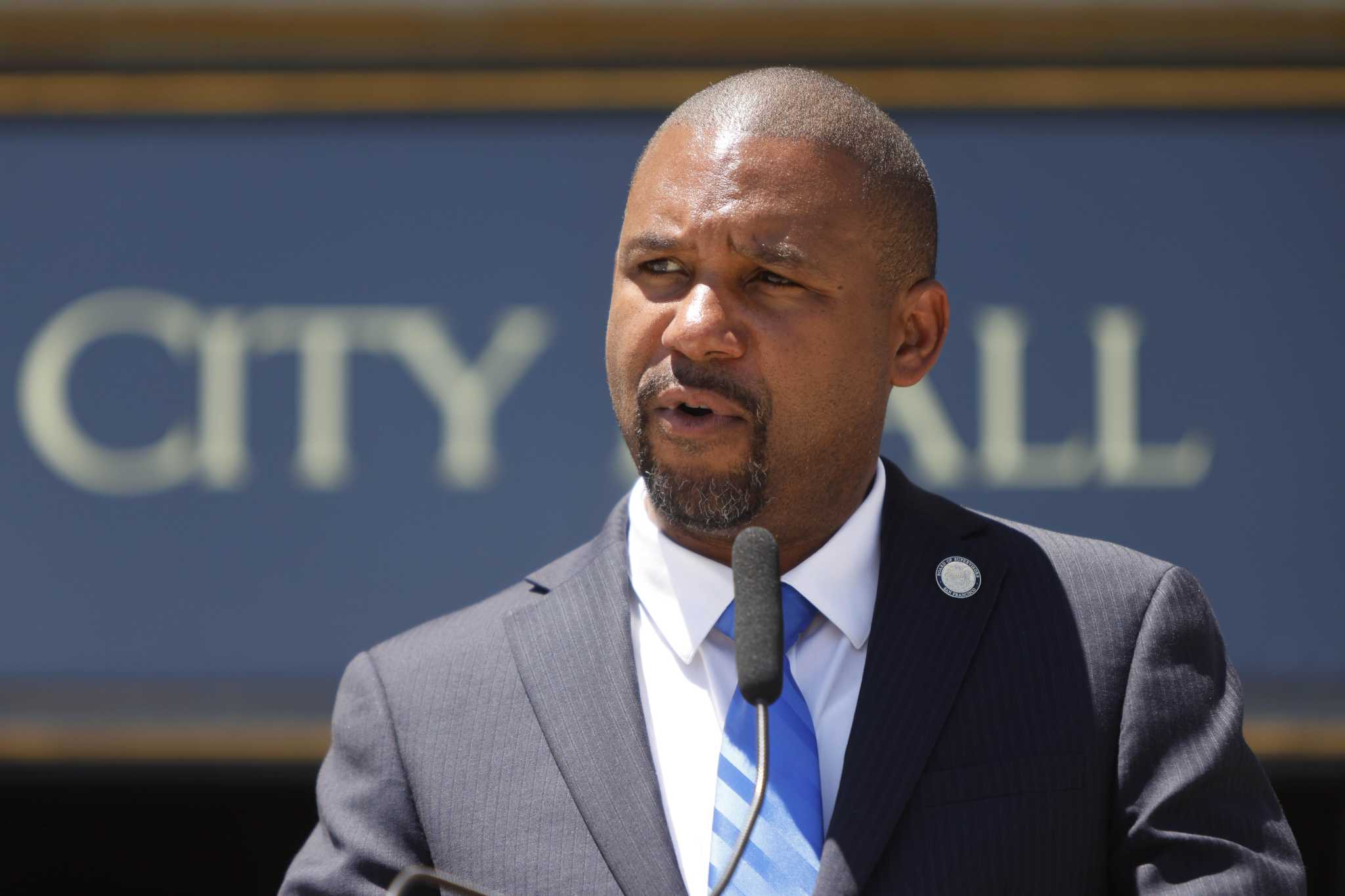San Francisco politicians are set to publicly consider a draft plan to provide reparations to the city’s Black community, but they will not yet decide the fate of the most ambitious recommendation: $5 million lump-sum payments to an unknown number of eligible recipients.
The Board of Supervisors will hold a hearing Tuesday about the reparations plan crafted by a committee tasked with proposing steps the city can take to remedy harms that Black residents endured over generations because of systemic racism and the legacy of slavery.
San Francisco isn’t alone in its efforts: A first-in-the-nation state task force is also studying how to implement reparations for all of California. The Chicago suburb of Evanston in 2021 became the first U.S. city to agree to make reparations available to Black residents.
While the San Francisco African American Reparations Advisory Committee’s draft proposal includes dozens of recommendations, the potential $5 million one-time payments could be an extremely costly and politically difficult action to implement. Multiple supervisors, including Board President Aaron Peskin, have said the payments are likely not financially feasible for now. Conservatives have panned the idea to local and national media outlets.
It’s not yet clear if a majority of supervisors would agree to adopt that recommendation. The board won’t decide on any specific reparations proposals, including potential cash payments, until after the committee submits its final report in June.
In all, the draft reparations plan includes more than 100 recommended actions related to economic empowerment, education, health and public policy.
“If you look at the (draft) report, you’ll see so many examples of how Black folks were done wrong here in San Francisco, and all of that can really be traced back to the negative effects of slavery, which traced back to negative policies across the country, San Francisco being no different,” said Supervisor Shamann Walton, who has been leading the board’s efforts to develop the reparations plan since 2020.
In an interview with The Chronicle on Monday, Walton declined to discuss the specific cash payment proposal included in the draft reparations plan.
“I am looking at all the recommendations and I will not weigh in in terms of what we should prioritize until after the final report is submitted,” he said.
The full scope and cost of the potential lump-sum payments isn’t yet clear. To be eligible for reparations payments under the draft plan, recipients would have to be 18 or older and have identified as Black or African American on public documents for at least a decade. Recipients would also have to meet other criteria that may include proving that they were born in San Francisco between 1940 and 1996, migrated to the city during the same years, lived in the city for at least 13 years or were displaced from the city because of urban renewal between 1954 and 1973.
The committee has not said how many people might qualify for the payments, but it will likely include an estimate in its final report, said chair Eric McDonnell, a native San Franciscan who is the CEO and founder of the consulting firm Peacock Partnerships.
Committee members are not analyzing how the city would fund reparations payments.
“We were not charged with doing a feasibility study,” McDonnell told The Chronicle. “We were charged with chronicling the harm and assigning the value. Period. Think about it like an appraisal of your home. You don’t get a number that the market will bear — you get the value of the home. Does the market pay that? Maybe. Maybe not.”
The draft reparations plan details the history of discrimination and displacement Black people have faced in San Francisco, including racial covenants in housing deeds that specified that only White people could live in certain homes and neighborhoods. Black people were also systematically denied bank loans for homes in areas where the government didn’t want them to live.
After World War II, when thousands of Black residents moved to San Francisco to work shipyard jobs, the city’s urban renewal plan led to the bulldozing of 40 square blocks in the predominantly-Black Fillmore district, displacing about 20,000 people, according to the draft plan. San Francisco’s Black population peaked at about 13% in 1970 and has since fallen to about 5%.
Beside the potential cash payments, the draft plan from the reparations committee recommends that the city consider supplementing African American income of low-income households to match the city’s area median income, which was $97,000 for one person in 2022.
Another recommendation is that the city offer first choice for subsidized below-market rate rental units to people who qualify for reparations. Other recommendations would have the city invest in scholarships and tuition assistance and even potentially eliminate student loan debt for Black San Franciscans that went through the city’s public school system.
Supervisor Myrna Melgar said she felt the reparations committee had done “exactly what we asked them to do.”
“This report is good. I am ready to accept it,” she said in an interview. “That doesn’t mean that we’re approving the $5 million for every person … But I think it’s important for us to acknowledge that, as a city, we have not done right by some of our citizens.”
While Melgar said she had not studied the cash payment proposal in detail, she seemed open to the general concept.
“I push back against people who think that’s too much or think that’s ridiculous,” Melgar said. “This is all well documented in history. We know that people were systematically excluded from educational opportunities, home ownership opportunities, everything down the line. How much does that cost? How do we quantify that?”
Supervisor Dean Preston’s office confirmed to The Chronicle on Monday that he supports cash reparations payments in San Francisco. He said in a statement that the committee’s recommendations were “challenging the status quo to push city leadership and the public to rethink what is possible when it comes to racial justice in our City.”
San Francisco has a recent history of steering public money toward helping Black residents. In 2020, after the police killing of George Floyd led to nationwide outcry, Mayor London Breed and Walton pledged to shift tens of millions of dollars away from law enforcement and toward programs that support the city’s African American community. That effort, known as the Dream Keeper Initiative, will also be discussed by supervisors on Tuesday.
But any serious effort to set aside funds for reparations would likely run into resistance due to the city’s grim financial state: Officials are projecting a $728 million deficit over the next two fiscal years.
“San Francisco doesn’t have the financial wherewithal, even if we thought it was good policy, to get into the reparations payment business, but that should not truncate a conversation about ways that this society and its government should address past ills,” said Peskin, the board chairman.
Peskin said he did not think lump-sum reparations payments were feasible for San Francisco right now and wanted to focus on the dozens of other long-term actions proposed in the draft plan.
“That is the bigger, harder conversation, and I think that we would be doing a disservice if we got lost in the politics of a one-and-done reparations payment,” he said.
At least two of Peskin colleagues, Supervisors Joel Engardio and Hillary Ronen, have previously expressed similar views, telling The Chronicle that they thought the city probably couldn’t afford $5 million individual reparations payments.
John Dennis, the chairman of San Francisco’s Republican Party, was blunt in his criticism of the potential reparations payments, telling ABC7 that the cash contribution idea was “ludicrous on its face” and nonsensical in the context of the city’s already massive budget.
McDonnell, the committee chair, said members understood that not all of the actions they were recommending could be implemented immediately. But he said some form of cash payments to the city’s Black residents should happen sooner rather than later.
“Whether it’s the full $5 million or not, financial repair should be included,” he said. “When you consider all of the ways in which the systems and practices have been managed to exclude and steal, if you will, the opportunities for financial mobility — families are hurting and have been for decades, if not longer. Financial repair is time sensitive. That is not one that can or should wait.”
Reach J.D. Morris: jd.morris@sfchronicle.com; Twitter: @thejdmorris






